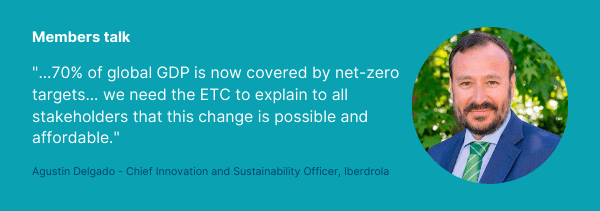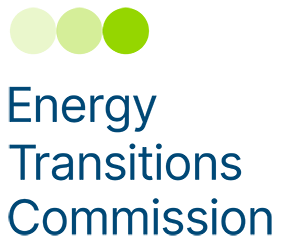Get to know our members and what being part of the ETC means to them.
Today our focus is on Iberdrola. We hear from their Chief Innovation and Sustainability Officer, Agustin Delgado. Iberdrola have been with the ETC since March 2020 and began a thorough transformation of its business model more than 20 years ago, when it opted for a sustainable, safe and competitive energy model.

- Why now – what is happening around the world now that makes the ETC essential?
The energy transition is accelerating because clean technologies are reducing costs faster than expected and because policy makers are responding to the increasing calls from society to commit to climate action. We are in a key moment as countries committing to net-zero by mid-century cover over 70% of global GDP and CO2 emissions. So, we need clarity of mind to know how to change things and how to move forward. And this is why the ETC is so necessary. We need this great coalition to explain to all stakeholders, including policymakers, that this change is possible and affordable. Reports from the ETC set paths and recommend how we can be successful in this big challenge.
- What do you think is the ETC’s most impactful achievement since you’ve been a Commissioner?
I have been a Commissioner of the ETC for a few months. Based on my experience working with the ETC, I think there are two key elements of its success. The first one is having a great group of forward-looking people. This diversity makes the discussions and assessments very profound and complete, touching all sectors & geographies and considering many different points of view. And the second key element is the quality of its team. Coordinating all these people is not easy and discussions are led with efficiency and with a clear direction in mind. Through these elements, I have seen the recent publication of two reports, one about how the power sector can provide all the clean electricity needed to decarbonize the economy, reaching very high levels of electrification, and the other about how green hydrogen can be the best complement to this electrification. These two reports are going to be a clear reference for all the people that want to move fast to make the energy sector sustainable and without emissions. They will serve as inspiration of what technologies and policies to implement.
- What is the biggest obstacle on the journey to net-zero?
We have the right technologies to develop and I think that financial resources will not be a big constraint if change is done in a proper way. For me, the energy sector’s biggest obstacle to reach net-zero is to change our behaviours. Because it is not enough to want to move and change things. The most difficult aspect is to change how we live and how we do things. Fossil fuels have been the basis of our economy and our way of life for over a century now. The global economic system and legal frameworks are based on this, and all of it must change. We have to adopt clean technologies, but for this to happen, we need to change our legal and tax systems, change our innovation policies, change our energy markets, change our industrial processes, even change the way we eat and move. So, to achieve our climate targets, we need to change our mental framework.
- Which is the key date in your calendar on the road to net-zero, and why?
The moment is now. In the last months, climate momentum has been growing very rapidly. But we are not doing enough. All projections say that, at this pace, we will not be able to achieve global climate goals. We must improve policies and really move from words to deeds. This decade has been called the “decisive decade”, but for this to happen, we must start now. We need to deploy current clean technologies as fast as we can, and we must develop new technologies for the remaining niches. And there is a lot to do. We cannot sit and wait. We really are in a climate emergency and we need to do everything we can, starting from now.
- What’s on your reading list?
I follow a wide range of publications on climate change, of course. From scientific reports on climate scenarios or publications from the UN’s IPCC, to reports or briefings on climate policies or business engagement with climate action from global alliances, cutting-edge research centres or universities. From a climate policy perspective, I am also very interested in having a broad picture of the main political milestones and policy developments. For that purpose, the briefings from Climate Action Tracker, NDC Partnership or European Climate Foundation are “a must”.
From a personal perspective, I am a fan of the documentary series “Our Planet” presented by David Attenborough. It is really wonderful and, at the same time, provides a comprehensive and didactic overview on how climate change impacts all living creatures.


